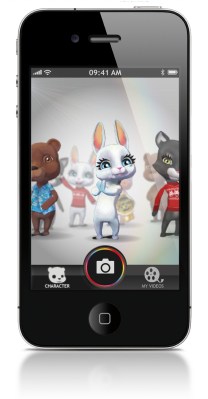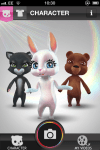The mobile messaging space is exploding with ever more colourful ways to communicate, augmenting the basics of text and voice — whether that’s stickers, one-to-many video chats or the ability to leave random missives for strangers. Zoobe, a Berlin-based startup, has another cutesy option to add to the pile: cartoon avatars that animate your voice message so you can ramp up the kawaii.
It’s not the only startup looking at this space. Indeed, U.K.-based HeadcastLab launched an iOS platform earlier this month that lets celebrities and brands create cartoon avatars to animate their messages. Which is basically the same premise — albeit going purely down the licensing route for now. An app like Talking Tom is also treading similar ground to Zoobe too. But with the mobile messaging giants steering relatively clear for now, there’s everything to play for.
Add to that, Zoobe argues its technology improves on rivals’ offerings by using distributed cloud services to process and deliver messages, rather than storing assets and animations locally on devices — which it says means minimal on-device storage space is required to use its apps. It has also patented the speech recognition technology which underpins the lipsyncing component of its animations.
Zoobe has gone for both anthropomorphism, with its Zoobe Pets iOS and Android apps, but also embraced a cartoonish uncanny valley with Zoobe Eve‘s doe-eyed humanoid caricatures. So whether you want a humanesque bunny to animate your message or a bunnyesque human they have your bases covered. Resulting video messages are viewable on-device and also online via a shareable URL. Since “soft launching” in December last year, the company says it has had more than 400,000 cross platform downloads — with no “active promotion” to date.
“Zoobe is targeted at anyone who wishes to send more personal, emotive messages,” CEO Lenard F. Krawinke tells TechCrunch. “We currently offer two apps; Zoobe Pets and Zoobe Eve, which are primarily aimed at slightly younger and slightly older audiences respectively based on the avatar characters available in each.”
The apps are free to download, with premium in-app content coming down the line to monetise the audience. The user selects which character they want to voice their missive, chooses a backdrop image (which can be created by taking a photo) and records their voice message which is then delivered to the chosen recipient animated by cutesy avatar.
As well as monetising via paid content in its apps — presumably new/special characters etc — it says it’s also looking at licensing its technology via a white label offering, much as HeadcastLab is. “We are in discussions with a number of license holders about white labelling our technology to produce their own avatar messaging services,” says Krawinke. “We are always open to hearing from interested parties in regard to licensing.”
The existing characters in both Zoobe Pets and Zoobe Eve are original creations from Zoobe’s own in-house artists. It says it has “a few new launches to supplement these currently in the works”.
The startup has just closed a seven-figure seed round, taking additional investment from its five original backers, and adding four new backers in the process. New investors include Thomas A. Curran (former Deutsche Telekom CTO), Rayk Reitenbach (IBB VC Technologie Fonds), and Lars Dittrich. Existing backers are Christophe Maire (Atlantic Internet), Karl-Heinz Brandenburg (Brandenburg Ventures), Dario Suter (DCM), Jens de Gruyter (United Arts Ventures), and Udo Schloemer (JMES Investments), who all contributed additional funds in this round.
The company currently employs more than 20 people but is looking to expand its team across all disciplines, particularly in mobile development. Unsurprisingly, as with HeadcastLab, Zoobe’s film director founder (Krawinke) has a background in broadcasting and animation, with previous work including animated feature films and advertising spots for Volkswagen and Disney.



